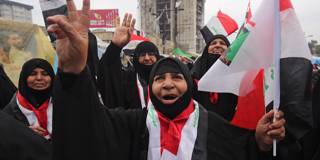Although the ongoing Shia-led protests in Iraq have not spread to regions with a Sunni majority (including Kurdish areas), many members of these communities have supported the protest clamor. Paradoxically, the power-sharing system that has fueled so much division may now be uniting Iraq’s citizens, if only in their opposition to it.
MADRID – With popular discontent erupting in numerous countries around the world, the mass demonstrations in Iraq that have triggered the fall of the country’s government have gone relatively unnoticed in the West. Although the violence perpetrated by the Iraqi security forces is estimated to have caused the deaths of around 500 people, the country’s upheavals over the last few decades have been so persistent that many Westerners seem to have become desensitized to them. And that is not the only uncomfortable reality: unlike in Venezuela or Hong Kong, popular indignation in Iraq is directed toward a Western-sponsored regime.

MADRID – With popular discontent erupting in numerous countries around the world, the mass demonstrations in Iraq that have triggered the fall of the country’s government have gone relatively unnoticed in the West. Although the violence perpetrated by the Iraqi security forces is estimated to have caused the deaths of around 500 people, the country’s upheavals over the last few decades have been so persistent that many Westerners seem to have become desensitized to them. And that is not the only uncomfortable reality: unlike in Venezuela or Hong Kong, popular indignation in Iraq is directed toward a Western-sponsored regime.